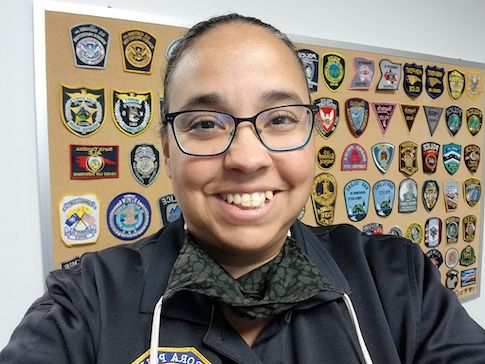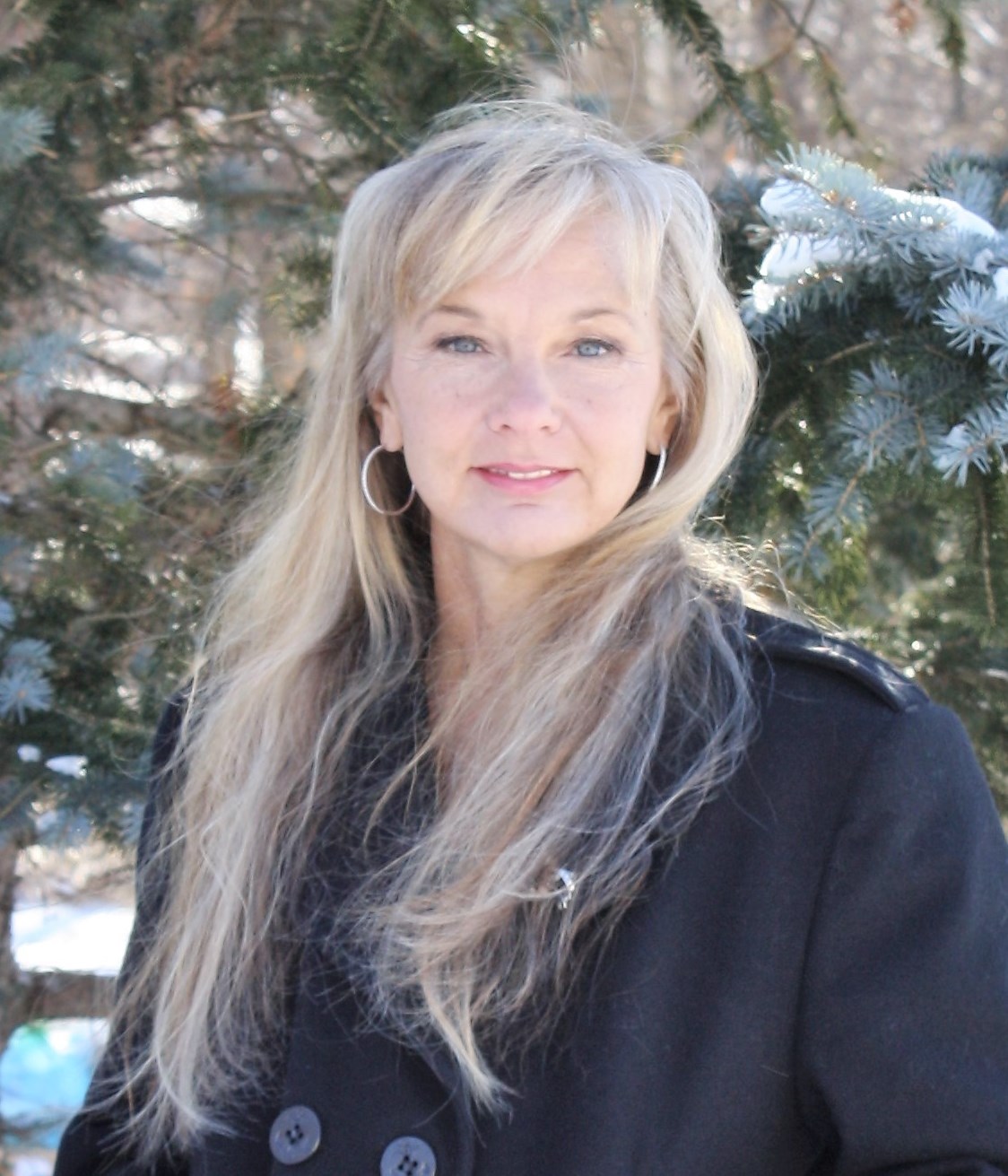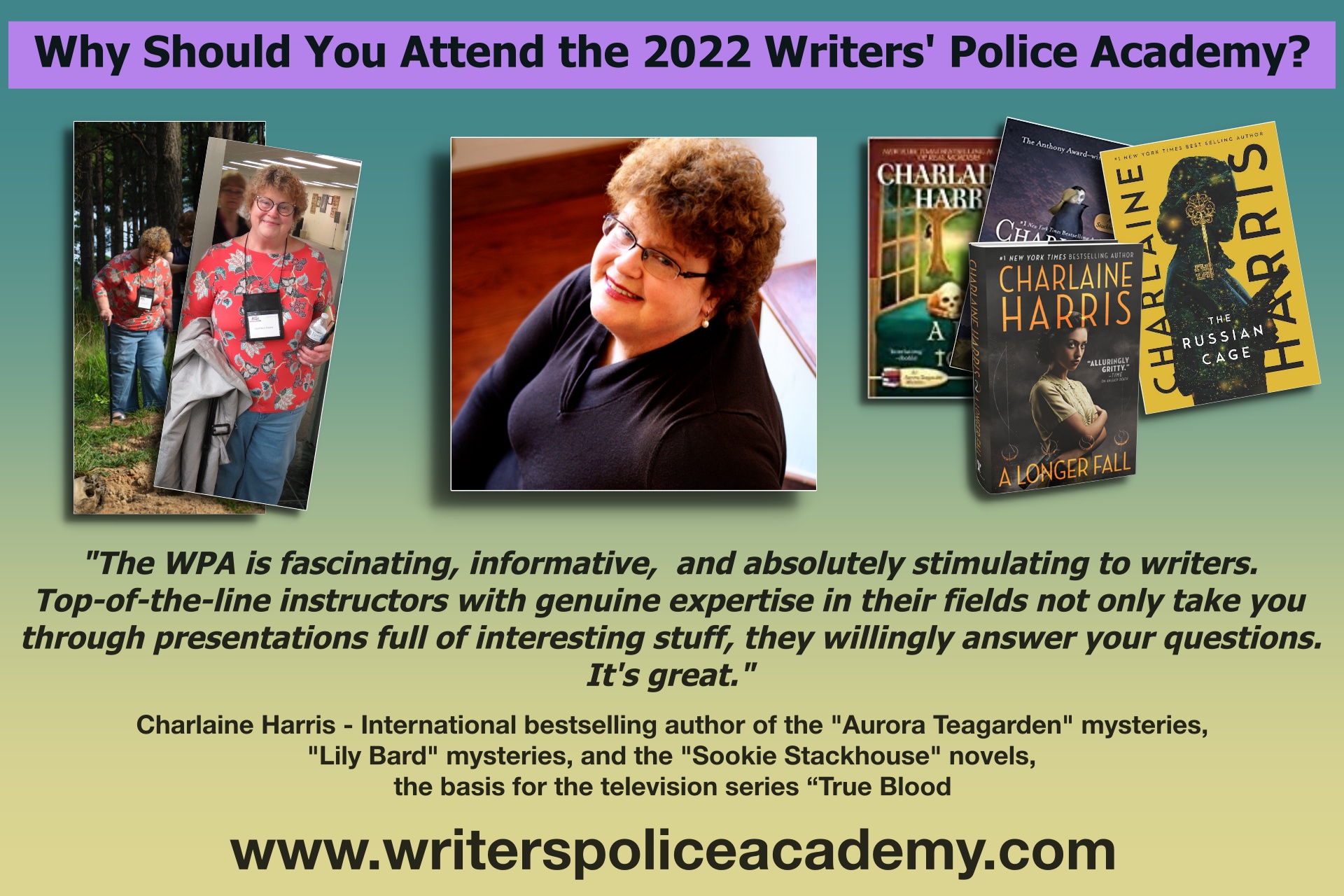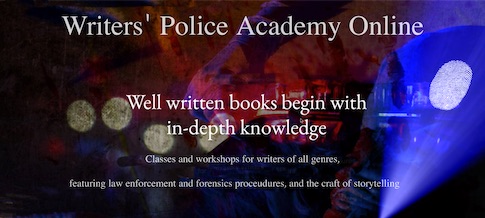WRITERS’ POLICE ACADEMY

Within the next couple of days Writers’ Police Academy Online will officially open registration for the daylong seminar called “Mystery and Murder: Transforming Reality into Fantastic Fiction.” This incredible, one-of-a-kind event is scheduled to take place on December 5, 2020.
In the meantime, we’re hard at work adding the finishing touches—bells, whistles, and shiny doodads—the brand new website. I’m anxious for you to see it.
I’ll announce in advance, on social media and on this website, when the site will go live. When it does, registration will also be live and you may immediately sign up.
As always, the quality of our programs is more important than selling a gazillion seats; therefore class size is extremely limited to allow a better learning experience for all. Registration is on a first-come, first-served basis and will close when the maximum number of attendees sign up.
The exciting December session, featuring #1 International Bestselling Author Tami Hoag and top forensics and crime scene investigation experts Dr. Katherine Ramsland, Lisa Black, and Lisa Provost, is live and interactive. Instructors will deliver their presentations and respond to questions in real time using Zoom. Class size is limited and seats will be filled on a first-come, first-served basis.
Again, registration for this fabulous and unique online event is coming within the next couple of days, so please watch for the announcements!
Mystery and Murder: Transforming Reality into Fantastic Fiction
When: December 5, 2020
Classes and Instructors:
Not Just the Facts, Ma’am
How to take all your newfound knowledge of police and forensic work and carefully weave it into the tapestry of your story.
Instructor, #1 International Bestselling Author Tami Hoag

Tami Hoag is the #1 International bestselling author of more than thirty books published in more than thirty languages worldwide, with more than forty million books in print. Renown for combining thrilling plots with character-driven suspense, crackling dialogue and well-research police procedure, Hoag first hit the New York Times bestseller list in 1996 with NIGHT SINS, and each of her books since has been a bestseller, including her latest, THE BOY. She lives in the greater Los Angeles area.
Sleuthing the Clues in Staged Homicides
Death scenes have been staged in a variety of ways, and it takes an observant investigator to spot the signs. It might be a 911 call, an inconsistency between the scene and the narrative, an uncharacteristic suicide note, or a distinctive signature that signals something not quite right. Some set-ups have been ingenious! Ramsland uses cases to illustrate actual staged scenes, and describes the types of skills investigators need to be able to spot and reconstruct staged incidents.
Instructor, Katherine Ramsland

Katherine Ramsland is a professor of forensic psychology at DeSales University in Pennsylvania, where she also teaches criminal justice and serves as the assistant provost. She holds a master’s in forensic psychology from the John Jay College of Criminal Justice, a master’s in clinical psychology from Duquesne University, a master’s in criminal justice from DeSales University, and a Ph.D. in philosophy from Rutgers. She has been a therapist and a consultant. Dr. Ramsland has published over 1,000 articles and 66 books.
Dr. Ramsland’s background in forensics positioned her to assist former FBI profiler John Douglas on his book, The Cases that Haunt Us, to co-write a book with former FBI profiler, Gregg McCrary, The Unknown Darkness, to collaborate on A Voice for the Dead with attorney James E. Starrs on his exhumation projects, and to co-write a forensic textbook with renowned criminalist Henry C. Lee, The Real World of a Forensic Scientist.
For seven years, she contributed regularly to Court TV’s Crime Library, and now writes a column on investigative forensics for The Forensic Examiner and a column on character psychology for Sisters in Crime; offers trainings for law enforcement and attorneys; and speaks internationally about forensic psychology, forensic science, and serial murder.
The Call You Get is Not Always the Call You Get: When a Routine Death Investigation Crosses State Lines and Multiple Jurisdictions
Case Study – On Valentine’s Day, 2014, the staff of a local dialysis clinic were worried. One of their elderly patients had missed three appointments. They called 911 and asked if officers could check on their patient, wondering if maybe he’d fallen and needed assistance. When officers arrived on scene, they found the elderly patient deceased from an apparent medical apparatus failure. At least that’s what it looked like at first; however, they’d uncovered a homicide. This convoluted investigation took Lisa Provost and members of her CSI team two states away during their investigation.
Instructor – Lisa Provost, Aurora Colorado Police Department Forensic Supervisor

Lisa Provost began studying Forensic Biology at Guilford College, in Greensboro, N.C., where she received a bachelor’s degree in Forensic Biology. In December 2012, she joined the Fayetteville Police Department as a Forensic Technician.
During her time as a Forensic Technician trainee, Lisa completed a six-month instruction program with the Fayetteville Police Department which culminated with a one-week exam and oral review board. With the training and testing behind her, Lisa began working the road. Her passion for learning and for her work were the catalysts that pushed her to attend advanced training courses, in earnest. In May 2015, she was promoted to Forensic Supervisor overseeing Fayetteville PD’s Forensic Unit.
Four years later, Lisa accepted a position with the Aurora Colorado Police Department as a Forensic Supervisor. So, she and her husband, an Air Force veteran, packed their belongings and moved to Colorado.
In 2016. Lisa attended the Management Development Program at the N.C. Carolina Justice Academy. In its twenty-eight-year history, at the time the program was held, Lisa was the only civilian accepted into the program and, of the nineteen attendees in the program, Lisa was the only female. The five-hundred-hour leadership training program was completed over an eleven-month period and, besides the completion of her bachelor’s degree, is one of her proudest achievements.
In addition, Lisa has completed over five-hundred-hours of forensic training that includes basic death investigation, child death investigation, advanced child death investigation, and officer-involved shooting investigations.
Lisa Provost was was born and raised in NY state where she started dating the man who would later become her husband. The couple married in 1998, the time when he enlisted in the U.S. Air Force. In 2003, when her husband’s enlistment was complete, they moved to North Carolina.
Little Known Facts About Crime Scenes
An in-depth look at the problems and challenges with crime scene evidence such as fingerprints, arson, bite marks, and more. Instructor, Lisa Black

Lisa Black is the NYT bestselling author of 14 suspense novels, including works that have been translated into six languages, optioned for film, and shortlisted for the inaugural Sue Grafton Memorial Award. She is also a certified Crime Scene Analyst and certified Latent Print Examiner, beginning her forensics career at the Coroner’s office in Cleveland Ohio and then the police department in Cape Coral, Florida. She has spoken to readers and writers at numerous conferences and will be a Guest of Honor at 2021 Killer Nashville.
In her August release, Every Kind of Wicked, forensic scientist Maggie Gardiner and homicide detective Jack Renner track down a nest of scammers. www.lisa-black.com
More spectacular online workshops, seminars, and webinars are on the way!! Details about the January and February daylong seminars are coming soon!
Research is the name of the game if a crime writer’s goal is accuracy about a particular aspect of their story, such as murder, cops, and investigations of crimes. Unfortunately, some writers avoid any and all cop-type research, believing they already have all the answers because they watch crime shows on television, and/or their BFF’s cousin’s next door neighbor once lived in the same town as a guy who used to work with a woman who dated the brother of a man who once stood in a grocery store checkout line next to a police detective’s auto mechanic. Well, that sort of connection won’t quite cut it if the desired result is realism.
So, to assist writers who may have incorrectly used one or more of the terms listed below, well, here you go. Yes, I’ve seen each of these used incorrectly. For example, no, transient evidence is not the evidence left behind by homeless criminals …
ABFO Scales: (American Board of Forensic Odontology scales). An L-shaped piece of plastic used in crime scene photography. Scales are marked with circles, black and white bars, and gray bars. These markings aid in distortion compensation and provide exposure determination. Measurements on the scales are typically marked in millimeters.
Bindle Paper: Paper that’s folded to safely contain, store, and transport trace evidence.
Crime Writer: Person who commits multiple murders within the narrow confines of book covers. Crime writers are known to leave behind scores of evidence and sometimes a handful of cliches.
Faraday Bag: Special collection bags for electronic parts. Faraday bags are lined to protect the contents from electromagnetic forces that could damage or destroy evidence.
Historical Fiction: The official residence of cordite. Actually, historical fiction is the ONLY place where cordite and its odor should be used by writers.
Latent Print: A print that’s not readily visible, or one that’s visible only by enhancement.
Odor of Cordite: An imaginary odor detected only by modern writers who should know better … but don’t.
Porous Container: Packaging through which liquids or vapors may pass (cloth, paper, etc.).
Presumptive Test: A non-confirmatory test used to screen for the presence of substances such as drugs or blood. Test kits used by officers in the field are presumptive test kits. Confirmation testing is conducted in official laboratories by trained and/or certified professionals.
Primary Crime Scene: In homicide investigations, the place where the body is found is the primary crime scene. Typically, this is where the investigation begins. Keep in mind, though, there may be multiple crime scenes (crime scene – any place where evidence of a crime is found).
Scene of the Crime: The location where a crime was committed.
Slide-Racking: The totally unbelievable action of pulling and releasing the slide on a semi-automatic pistol just prior to engaging a dangerous situation. Cops carry guns with a round in the chamber. To rack the slide would eject the pre-loaded round leaving them with one less bullet.
Tertiary DNA: DNA can be accidentally transferred from one object to another. A good example could be the killer who shares an apartment with an unsuspecting friend. He returns home after murdering someone and then tosses his blood-spatter-covered shirt into the washer along with his roommate’s clothing. The machine churns and spins through its wash cycles, an action that spreads the victim’s DNA throughout the load. Police later serve a search warrant on the home, seize the clothing, and discover the victim’s DNA on the roommate’s jeans. The innocent roommate is arrested for murder.

Tertiary Transfer of DNA Evidence
The same can occur with touch DNA. A man shares a towel with his wife and his DNA is subsequently transferred to her face and neck. Later, a stranger wearing gloves chokes the woman to death, transferring the husband’s DNA from the victim’s face to the killer’s gloves. The assailant removes the gloves and leaves them at the scene. Police confiscate the gloves, test them, and find the husband’s DNA. He is then charged for his wife’s death while the real killer is free to murder again.
The example above (the choking case) actually happened, and those of you who attended the Writers’ Police Academy session taught by DNA expert Dr. Dan Krane heard him speak of it. He was the expert who proved this was indeed possible and he testified to it in the groundbreaking case involving accused killer Dr. Dirk Grenadier.
Transient Evidence: Evidence which could lose could lose its evidentiary value if not preserved and protected from the elements or other hazards (blood, semen, etc.). This is not evidence left behind by homeless people. It could be, though, if the killer just happened to be someone who lives on the streets. If so, the items collected could then be called transient transient evidence.
White Horse Syndrome: No, FBI special agents do not ride into town on white horses to take over cases from local cops, nor do they work local murder cases. And … they do not investigate all kidnapping cases. Many writers, bless their hearts, are infected with White Horse Syndrome (WHS). Fortunately, it’s an easily curable disease. Unfortunately, though, some refuse to seek help.
If you or someone you know is affected by WHS, immediate intervention is needed.
To help battle WHS I strongly urge you to attend the upcoming Writers’ Police Academy Online daylong seminar “Mystery and Murder: Transforming Reality into Fantastic Fiction.” In this session you’ll learn behind the scenes tips, tactics, and techniques used by top crime scene investigators Lisa Provost and Lisa Black. Also, forensic psychology expert Dr. Katherine Ramsland is scheduled to teach a fascinating workshop about staged homicide scenes.
Then, in a rare learning opportunity, #1 bestselling author Tami Hoag wraps up the event with her class “Not Just the Facts, Ma’am.” Hoag’s amazing workshop details how to carefully weave all your newfound knowledge of police and forensic work into your story.
Attending Writers’ Police Academy Online classes could be the important first step on the road to recovery from the dreaded White Horse Syndrome.
Registration details and an all new website are coming soon.
In addition to Tami Hoag’s session, other classes include:
“Little Known Facts About Crime Scenes” – instructor Lisa Black.
 Lisa Black is the NYT bestselling author of 14 suspense novels, including works that have been translated into six languages, optioned for film, and shortlisted for the inaugural Sue Grafton Memorial Award. She is also a certified Crime Scene Analyst and certified Latent Print Examiner.
Lisa Black is the NYT bestselling author of 14 suspense novels, including works that have been translated into six languages, optioned for film, and shortlisted for the inaugural Sue Grafton Memorial Award. She is also a certified Crime Scene Analyst and certified Latent Print Examiner.
“Sleuthing the Clues in Staged Homicides” – instructor Dr. Katherine Ramsland.
 Katherine Ramsland teaches forensic psychology at DeSales University, where she is the Assistant Provost. She has appeared on more than 200 crime documentaries and magazine shows, is an executive producer of Murder House Flip, and has consulted for CSI, Bones, and The Alienist. The author of more than 1,000 articles and 68 books, including How to Catch a Killer, The Psychology of Death Investigations, and The Mind of a Murderer, she spent five years working with Dennis Rader on his autobiography, Confession of a Serial Killer: The Untold Story of Dennis Rader, The BTK Killer. Dr. Ramsland currently pens the “Shadow-boxing” blog at Psychology Today and teaches seminars to law enforcement.
Katherine Ramsland teaches forensic psychology at DeSales University, where she is the Assistant Provost. She has appeared on more than 200 crime documentaries and magazine shows, is an executive producer of Murder House Flip, and has consulted for CSI, Bones, and The Alienist. The author of more than 1,000 articles and 68 books, including How to Catch a Killer, The Psychology of Death Investigations, and The Mind of a Murderer, she spent five years working with Dennis Rader on his autobiography, Confession of a Serial Killer: The Untold Story of Dennis Rader, The BTK Killer. Dr. Ramsland currently pens the “Shadow-boxing” blog at Psychology Today and teaches seminars to law enforcement.
“The Call You Get is Not Always the Call You Get: When a Routine Death Investigation Crosses State Lines and Multiple Jurisdictions” – instructor Lisa Provost, Forensic Supervisor at Aurora Colorado Police Department.
 Lisa has completed over five-hundred-hours of forensic training that includes basic death investigation, child death investigation, advanced child death investigation, and officer-involved shooting investigations.
Lisa has completed over five-hundred-hours of forensic training that includes basic death investigation, child death investigation, advanced child death investigation, and officer-involved shooting investigations.
 Tami Hoag is the #1 International bestselling author of more than thirty books published in more than thirty languages worldwide, with more than forty million books in print. Renown for combining thrilling plots with character-driven suspense, crackling dialogue and well-research police procedure, Hoag first hit the New York Times bestseller list in 1996 with NIGHT SINS, and each of her books since has been a bestseller, including her latest, THE BOY. She lives in the greater Los Angeles area.
Tami Hoag is the #1 International bestselling author of more than thirty books published in more than thirty languages worldwide, with more than forty million books in print. Renown for combining thrilling plots with character-driven suspense, crackling dialogue and well-research police procedure, Hoag first hit the New York Times bestseller list in 1996 with NIGHT SINS, and each of her books since has been a bestseller, including her latest, THE BOY. She lives in the greater Los Angeles area.
Here’s a brief video of crime scene processing, photography, and evidence collection.
For over a dozen years the Writers’ Police Academy has delivered sensational hands-on training, as well as the extremely popular Virtual MurderCon event that took place in August, 2020.
During those twelve-plus years, many writers, fans, readers, and law enforcement professionals requested that we develop online courses since many people would love to attend our in-person events but are unable to do so for various reasons.
A few years ago I asked our website guru, Shelly Haffly, to create an online teaching platform that would run in conjunction with this blog. Unfortunately, it has sat dormant since that day. My reason for not launching the program was that some of the pre-designed, built-in functions were a bit too complicated for my “tech-less” mind. However, with the rise of Zoom and other video conferencing and teaching programs, well, the time is now right.
So, without further delay, I’m pleased to announce that “Writers’ Police Academy Online” will officially open its virtual doors in October, 2020. The all new website is currently under construction and registration will soon be available for the first daylong seminar called “Mystery and Murder: Transforming Reality into Fantastic Fiction.”
This first session is live and interactive, meaning that instructors will deliver their presentations and respond to questions in real time. By the way, the instructors for this first seminar are fantastic!
Registration for this fabulous and unique online event is coming soon!
Mystery and Murder: Transforming Reality into Fantastic Fiction
When: October 24, 2020
Classes and Instructors:
Not Just the Facts, Ma’am
How to take all your newfound knowledge of police and forensic work and carefully weave it into the tapestry of your story.
Instructor, #1 International Bestselling Author Tami Hoag

Tami Hoag is the #1 International bestselling author of more than thirty books published in more than thirty languages worldwide, with more than forty million books in print. Renown for combining thrilling plots with character-driven suspense, crackling dialogue and well-research police procedure, Hoag first hit the New York Times bestseller list in 1996 with NIGHT SINS, and each of her books since has been a bestseller, including her latest, THE BOY. She lives in the greater Los Angeles area.
Sleuthing the Clues in Staged Homicides
Death scenes have been staged in a variety of ways, and it takes an observant investigator to spot the signs. It might be a 911 call, an inconsistency between the scene and the narrative, an uncharacteristic suicide note, or a distinctive signature that signals something not quite right. Some set-ups have been ingenious! Ramsland uses cases to illustrate actual staged scenes, and describes the types of skills investigators need to be able to spot and reconstruct staged incidents.
Instructor, Katherine Ramsland

Katherine Ramsland is a professor of forensic psychology at DeSales University in Pennsylvania, where she also teaches criminal justice and serves as the assistant provost. She holds a master’s in forensic psychology from the John Jay College of Criminal Justice, a master’s in clinical psychology from Duquesne University, a master’s in criminal justice from DeSales University, and a Ph.D. in philosophy from Rutgers. She has been a therapist and a consultant. Dr. Ramsland has published over 1,000 articles and 66 books.
Dr. Ramsland’s background in forensics positioned her to assist former FBI profiler John Douglas on his book, The Cases that Haunt Us, to co-write a book with former FBI profiler, Gregg McCrary, The Unknown Darkness, to collaborate on A Voice for the Dead with attorney James E. Starrs on his exhumation projects, and to co-write a forensic textbook with renowned criminalist Henry C. Lee, The Real World of a Forensic Scientist.
For seven years, she contributed regularly to Court TV’s Crime Library, and now writes a column on investigative forensics for The Forensic Examiner and a column on character psychology for Sisters in Crime; offers trainings for law enforcement and attorneys; and speaks internationally about forensic psychology, forensic science, and serial murder.
The Call You Get is Not Always the Call You Get: When a Routine Death Investigation Crosses State Lines and Multiple Jurisdictions
Case Study – On Valentine’s Day, 2014, the staff of a local dialysis clinic were worried. One of their elderly patients had missed three appointments. They called 911 and asked if officers could check on their patient, wondering if maybe he’d fallen and needed assistance. When officers arrived on scene, they found the elderly patient deceased from an apparent medical apparatus failure. At least that’s what it looked like at first; however, they’d uncovered a homicide. This convoluted investigation took Lisa Provost and members of her CSI team two states away during their investigation.
Instructor – Lisa Provost, Aurora Colorado Police Department Forensic Supervisor

Lisa Provost began studying Forensic Biology at Guilford College, in Greensboro, N.C., where she received a bachelor’s degree in Forensic Biology. In December 2012, she joined the Fayetteville Police Department as a Forensic Technician.
During her time as a Forensic Technician trainee, Lisa completed a six-month instruction program with the Fayetteville Police Department which culminated with a one-week exam and oral review board. With the training and testing behind her, Lisa began working the road. Her passion for learning and for her work were the catalysts that pushed her to attend advanced training courses, in earnest. In May 2015, she was promoted to Forensic Supervisor overseeing Fayetteville PD’s Forensic Unit.
Four years later, Lisa accepted a position with the Aurora Colorado Police Department as a Forensic Supervisor. So, she and her husband, an Air Force veteran, packed their belongings and moved to Colorado.
In 2016. Lisa attended the Management Development Program at the N.C. Carolina Justice Academy. In its twenty-eight-year history, at the time the program was held, Lisa was the only civilian accepted into the program and, of the nineteen attendees in the program, Lisa was the only female. The five-hundred-hour leadership training program was completed over an eleven-month period and, besides the completion of her bachelor’s degree, is one of her proudest achievements.
In addition, Lisa has completed over five-hundred-hours of forensic training that includes basic death investigation, child death investigation, advanced child death investigation, and officer-involved shooting investigations.
Lisa Provost was was born and raised in NY state where she started dating the man who would later become her husband. The couple married in 1998, the time when he enlisted in the U.S. Air Force. In 2003, when her husband’s enlistment was complete, they moved to North Carolina.
Little Known Facts About Crime Scenes
An in-depth look at the problems and challenges with crime scene evidence such as fingerprints, arson, bite marks, and more. Instructor, Lisa Black

Lisa Black is the NYT bestselling author of 14 suspense novels, including works that have been translated into six languages, optioned for film, and shortlisted for the inaugural Sue Grafton Memorial Award. She is also a certified Crime Scene Analyst and certified Latent Print Examiner, beginning her forensics career at the Coroner’s office in Cleveland Ohio and then the police department in Cape Coral, Florida. She has spoken to readers and writers at numerous conferences and will be a Guest of Honor at 2021 Killer Nashville.
In her August release, Every Kind of Wicked, forensic scientist Maggie Gardiner and homicide detective Jack Renner track down a nest of scammers. www.lisa-black.com
More spectacular online workshops, seminars, and webinars are on the way!! Details TBA.






